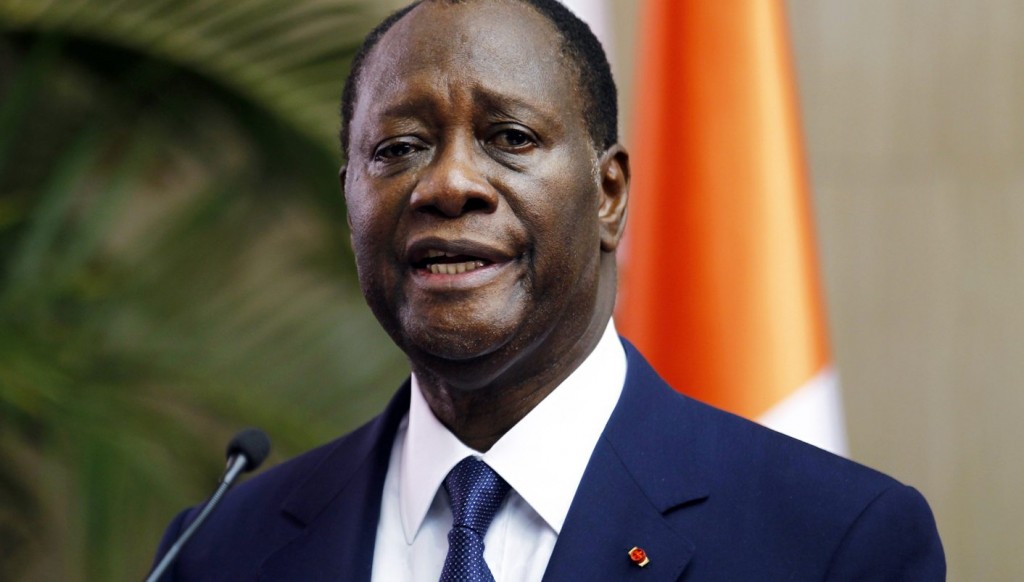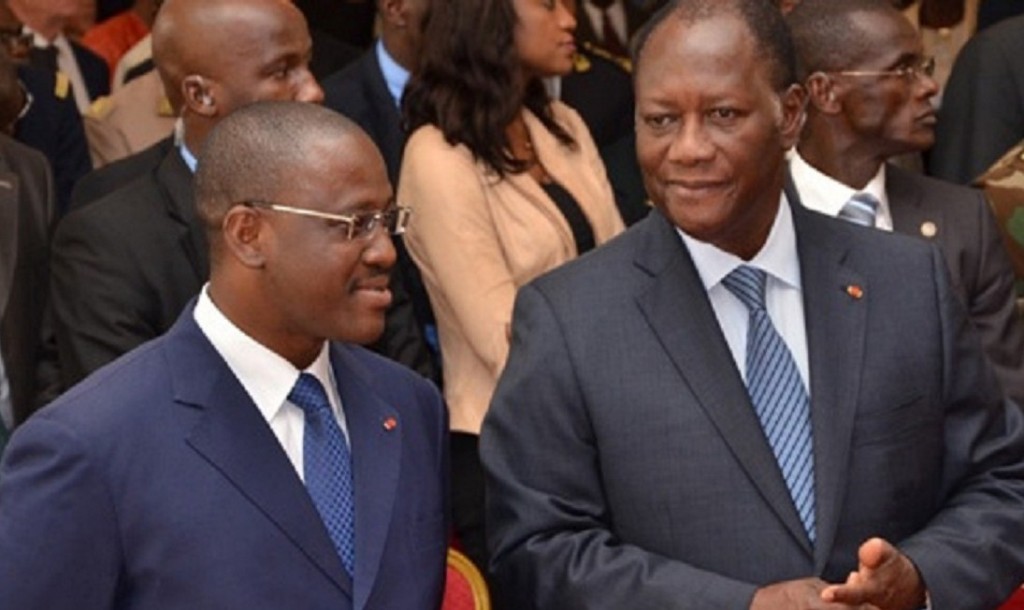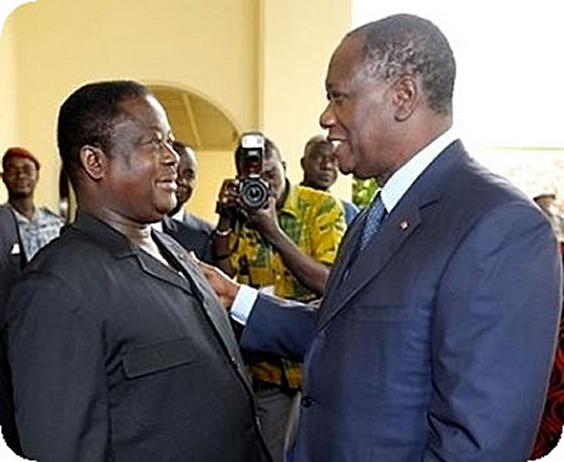Political tension rises in Cote d’Ivoire as elections loom

BY JIBRIL TURE
As the local and regional elections scheduled for 13 October loom in Cote d’Ivoire, political tension—without violence—has risen to the point of claiming the collapse of the perfect trio that ended President Laurent Gbagbo‘s grips on power seven years ago.
It took three political giants—and a quasi-civil war—to remove President Laurent Gbagbo from power in April 2011 when he stubbornly refused to concede defeat after losing the November 2010 election: now-President Alassane Ouattara who delivered the knock-out punch in the voting booths; former President Henri Konan Bedie whose PDCI-RDA party members (the oldest and largest party in the country) voted for Ouattara in the runoff; and former prime minister Guillaume Soro whose rebel forces, dubbed the New Forces, helped the Ouattara side during the initial phase of the civil war until international pressure, with then-French president Nicolas Sarkozy in the lead, gave the last blow that removed a starving Laurent Gbagbo from the basement of the presidential palace where he dug in as the civil war raged on.
Now, this perfect trio has fallen apart, just two months before the regional and local elections, and barely 18 months from the next presidential election.

The long-standing feud between President Ouattara and Guillaume Soro, the speaker of the parliament, flared up in late June when Kandia Camara, the Secretary-General of Ouattara’s political party, the Rally of the Republicans (RDR) and his educational minister, used very strong language to criticize Soro in an interview published by the weekly magazine Jeune Afrique.
In response to the repeated threats by Soro to leave the RDR under whose banner he ran and won the office of the speaker, the party’s Secretary-General stated in the said interview:
““No one has put a gun to his head and said to him ‘you have to be a member of the RDR.’ He’s [in the party] by his own choice, and if one day he decides to stop being a member, he’ll leave.”
Camara raged on:
“Let’s not forget that he [Soro] was elected speaker of the parliament under the umbrella of this party. I can say with a megaphone: he owes what he is today to President Ouattara and to the RDR.”
There were no reports of Soro’s public reactions to the remarks, but his communications director, Toure Moussa, and the latter’s colleague Franklin Nyamsi, did not hold their guns. They reportedly fired back insults at Camara, which infuriated President Ouattara who called the speaker to his residence on 1 July for a talk.
An official familiar with the situation told The African, on condition of anonymity for obvious reasons, that the president asked the speaker to fire his two aides, but unsuccessfully. Our source added that tension was so high that the speaker, who was scheduled to fly to Canada that night, had to postpone his departure.
The two officials met again on 7 August at the president’s residence for another talk which was attended by other officials. One source has described the talk to The African as “cordial.” But it should take more than one conversation to quell the longstanding, apparently deep-rooted quarrel between the one-time political allies.
The breakup of these two men who have impacted Cote d’Ivoire’s history over the past several years, and who hold so many state secrets, is bound to have significant consequences for the nation.

President Ouattara’s relationship with former President Henri Konan Bedie, the other member of the perfect trio, has gradually grown sour over the months to now reach the point of no-return, to the knowledge of everyone.
In violation of the agreement between the two men that President Ouattara’s party, the RDR, will stand behind the PDCI-RDA’s candidate for the 2020 presidential election in return for PDCI-RDA’s support for Ouattara’s two runs in 2010 and 2015, the current president wants that candidate to be chosen by a consortium of parties unified under the umbrella of the Rally of the Houphouetists for Democracy and Peace, RHDP (named in memory of the nation’s founding father, the late president Houphouet-Boigny).
The idea infuriated Bedie who, at one point, threatened to run in 2020. But that did not deter Ouattara. So on 16 July, Ouattara established the so-called unified RHDP as a full-scale party with the inclusion of other small parties, of which Bedie’s PDC-RDA refused to be a part. The rubicon was thus crossed.
For months, Bedie and Ouattara were able to behave in public in ways that did not confirm the swelling rumors about their “mutual resentment and irreconcilable differences.” But the show came to an end on 8 August when the two political giants met at the current president’s residence. The day following the 15-minute meeting that our source described as “cold,” the former president released a communique formally announcing their split.
The communique reads, in part:
“The PDCI-RDA realized that on 16 July 2018, a General Assembly for the creation of a unified party named RHDP was held at the Hotel Sofitel in Abidjan without it being convened by the chairman of the conference of the presidents of the political parties that are members of RHDP, the chairman of the PDCI-RDA. The PDCI-RDA wondered what justified the rush with which the unified party named RHDP was launched with disregards for the minimum of 12 to 18 months delay required for the completion of this project.”
Bedie wasted no time in firing the influential PDCI-RDA’s members who have shown interest in the RHDP.
Despite the political divorce between Ouattara and Bedie, some members of the top echelon of Bedie’s PDCI-RDA have joined the Ouattara-led unified RHDP, as illustrated by the recent appointment of Odette Ehui Agnero, formerly chairwoman of the women’s chapter of the PDCI-RDA, in the same position in the unified RHDP.
Ouattara’s RHDP is on a shopping spree for PDCI-RDA’s cadres. His minister of animal resources and fisheries, Adjoumani Kobenan—an influential PDCI-RDA member—this week relayed this provocative statement attributed to Ouattara that feels like a jab in the face of the PDCI-RDA:
“By instruction of the chairman of RHDP, H.E.Mr. Alassane Ouattara, I am pleased to inform all the delegates and officials of the PDCI-RDA’s base who have been punished, that they automatically become the new RHDP delegates in their localities. By the same token, their section’s secretaries automatically become the section’s secretaries of RHDP in their respective bases.”
By virtue of being at the helm of a consortium of parties, Ouattara now sits on an impressive number of potential votes that should make his party feel confident as new elections loom.


